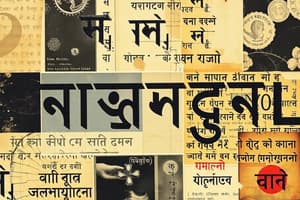Podcast
Questions and Answers
বাংলা ভাষার লেখার স্ক্রিপ্টে মোট কয়টি স্বরবর্ণ ব্যবহৃত হয়?
বাংলা ভাষার লেখার স্ক্রিপ্টে মোট কয়টি স্বরবর্ণ ব্যবহৃত হয়?
১২টি
বাংলা ভাষার লেখার স্ক্রিপ্টে মোট কয়টি ব্যঞ্জনবর্ণ ব্যবহৃত হয়?
বাংলা ভাষার লেখার স্ক্রিপ্টে মোট কয়টি ব্যঞ্জনবর্ণ ব্যবহৃত হয়?
৩৬টি
বাংলা ভাষা কি ধরনের ভাষা?
বাংলা ভাষা কি ধরনের ভাষা?
এগ্লুটিনেটিভ ভাষা
বাংলা ভাষায় কি ধরনের লেখাপদ্ধতি ব্যবহৃত হয়?
বাংলা ভাষায় কি ধরনের লেখাপদ্ধতি ব্যবহৃত হয়?
বাংলা ভাষায় কি ধরনের শব্দ ক্রম ব্যবহৃত হয়?
বাংলা ভাষায় কি ধরনের শব্দ ক্রম ব্যবহৃত হয়?
বাংলা ভাষায় 'কলাশে' শব্দে 'কলা-' অংশের অর্থ কি?
বাংলা ভাষায় 'কলাশে' শব্দে 'কলা-' অংশের অর্থ কি?
বাংলা ভাষার বিশেষ লক্ষণ কি?
বাংলা ভাষার বিশেষ লক্ষণ কি?
বাংলা ভাষায় কোন ধরণের বাক্য গঠনে বেদনশীলতা হয়?
বাংলা ভাষায় কোন ধরণের বাক্য গঠনে বেদনশীলতা হয়?
বাংলা ভাষায় 'ব্যঞ্জনবর্ণ' কি?
বাংলা ভাষায় 'ব্যঞ্জনবর্ণ' কি?
বাংলা ভাষায় 'সাধু' এবং 'অসাধু' কি?
বাংলা ভাষায় 'সাধু' এবং 'অসাধু' কি?
বাংলা ভাষায় 'নিষ্ঠা' এবং 'অনিষ্ঠা' কি?
বাংলা ভাষায় 'নিষ্ঠা' এবং 'অনিষ্ঠা' কি?
বাংলা ভাষায় 'ধবল' এবং 'উজ্জ্বল' কি?
বাংলা ভাষায় 'ধবল' এবং 'উজ্জ্বল' কি?
Flashcards are hidden until you start studying
Study Notes
Bengali Language: Exploring its Structure
The Bengali language, spoken by over 250 million people worldwide, is a rich and captivating tongue that forms the foundation of a thriving cultural and literary tradition across Bangladesh, West Bengal (India), and beyond. Let's venture into the intriguing world of Bengali language structure and uncover the characteristics that shape how we communicate.
Phonology and Script
Bengali, written in a unique script called Bengali Devanagari or Bengali Ganapati, uses 12 vowels and 36 consonants, making it a relatively complex language to learn. The script is based on a modified version of the Devanagari script and features a horizontal writing system (left to right). Bengali is also known for its use of diacritics, such as vowel marks, that appear above and below the consonants, providing a richness of expression and sound that is difficult to achieve in other languages.
Morphology
Like many other South Asian languages, Bengali is an agglutinative language. This means that words are often built by adding suffixes and prefixes that carry meaning, creating complex words with multiple parts. For example, the Bengali word "কলাশে" (kollashe) means "in a vase," with the prefix "কলা-" (kolla-) meaning "vase" and the suffix "-ে" (-e) indicating location.
Grammar and Word Order
Bengali grammar features a subject-object-verb (SOV) word order, which is unusual for English speakers. However, Bengali also has a flexible word order that allows for various rearrangements of words to create emphasis or focus on a particular phrase or sentence. In Bengali, nouns are unmarked for gender, which is a key feature of the language that distinguishes it from other Indo-European languages.
Syntax
Bengali syntax is characterized by a "verb-final" structure, where the verb usually appears at the end of a sentence. This feature, along with the SOV word order, can make Bengali sentences more challenging for those learning the language.
Vocabulary and Registers
Bengali is rich in vocabulary, with thousands of words derived from various sources, including Sanskrit, Arabic, Persian, and English. The language has a formal and informal register, allowing speakers to communicate according to their social context and relationship with the person they are speaking to.
Dialects and Regional Variations
Bengali is spoken in various dialects across Bangladesh and West Bengal. Some of the most prominent dialects include the Barishal, Chittagong, Dhaka, Khulna, Mymensingh, and Rajshahi dialects of Bangladesh, as well as the Murshidabad, Nadia, 24 Parganas, and Birbhum dialects of West Bengal. These dialects often feature subtle differences in pronunciation, vocabulary, and syntax, which can make communication challenging for speakers from different regions.
Conclusion
Understanding the structure of Bengali language provides a foundation for learning and mastering the language. By exploring its unique phonology, morphology, grammar, syntax, vocabulary, and dialects, one can delve deeper into the world of Bengali and appreciate its richness and beauty. Whether you're a student, scholar, or simply someone interested in the nuances of language, the Bengali language offers a fascinating and rewarding journey of discovery and learning.
[Markdown]
Studying That Suits You
Use AI to generate personalized quizzes and flashcards to suit your learning preferences.




